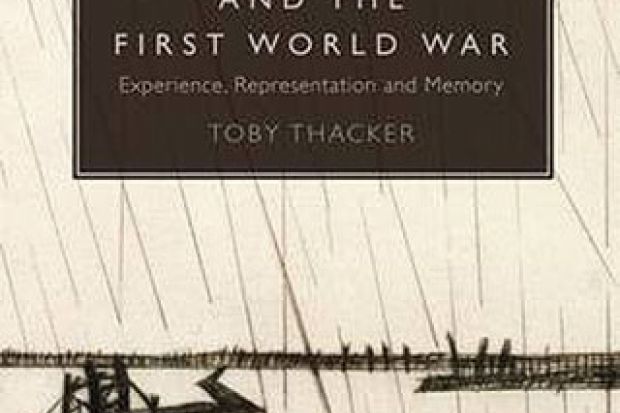T his book is, first and foremost, a good read. Toby Thacker has settled on a reliable and winning formula by prioritising personal experience as a way of navigating the First World War. His focus is on the stories of particular individuals who represented the war “creatively” in the public domain. This is then mapped on to a more conventional historical narrative that enables the reader to understand what was going on in military terms from 1914 onwards, but also to translate those potentially dry facts into the real lives of real people.
The individuals in question are 11 artists (broadly defined) who superficially represent the population of Britain during the war. Thacker is clear in his introduction that absolute representation would be impossible with such a small group; these figures have been chosen as a cross-section because of their backgrounds and their creativity, rather than because they were the best practitioners of their craft. They cross generations, gender and nationality. Some are very famous, others hardly known. Some survived the war and some did not. Their interwoven stories, drawing on their own words and those of the people who knew them, offer an interesting overview of the Great War from a range of perspectives, enhanced by Thacker’s lively prose and plenty of helpful and evocative photographs and illustrations.
Of course, precisely because no group of 11 people can really represent a nation at war, it is easy to criticise Thacker’s selections. Most strikingly, women and the older generation are notably under-represented. Of the 11, just two are women, and as both Vera Brittain and Kate Finzi were young and middle class and worked as nurses, we are given only a very narrow window on to the lives of women in wartime. Brittain’s story is the better known, and may not need repeating. Finzi, by contrast, has very little story to tell beyond the fact that she worked as a Voluntary Aid Detachment nurse and published an early patriotic memoir, Eighteen Months in the War Zone.
Given the amount of recent critical work done on women in the war, it is disappointing that Thacker could not find other, more diverse female subjects. Similarly, the only “older” people included here are Edward Elgar and Hubert Parry, both composers. On the one hand, their differing responses to the war make for an interesting comparison, given their similar backgrounds. On the other, there are a great many other older artists, including women, who may have offered a more varied reading.
All the rest are young men who collectively tell a number of different stories. Rupert Brooke and T. E. Lawrence are, of course, well known, but Thacker handles their experiences stylishly, and the reader is drawn into their lives and deaths. The inclusion of Welsh poet and artist David Jones and the poet Ellis Evans (who wrote under the name Hedd Wyn) adds to the Celtic dimension, but Scottish artists are notably missing. Painters Paul Nash, Christopher (Richard) Nevinson and Stanley Spencer round out the group; collectively, Thacker’s chosen 11 do manage to represent a range of social, cultural and political viewpoints.
The book’s final chapters on memory are particularly interesting, and fit well with much contemporary scholarship on legacy and remembrance. Its unique slant – the continued focus on the specific individuals – allows Thacker to engage with current thinking about the meaning of the war, but still invites us to care.
British Culture and the First World War: Experience, Representation and Memory
By Toby Thacker
Bloomsbury, 376pp, £70.00 and £22.99
ISBN 9781441121639 and 180742
Published 25 September 2014
Register to continue
Why register?
- Registration is free and only takes a moment
- Once registered, you can read 3 articles a month
- Sign up for our newsletter
Subscribe
Or subscribe for unlimited access to:
- Unlimited access to news, views, insights & reviews
- Digital editions
- Digital access to THE’s university and college rankings analysis
Already registered or a current subscriber? Login





